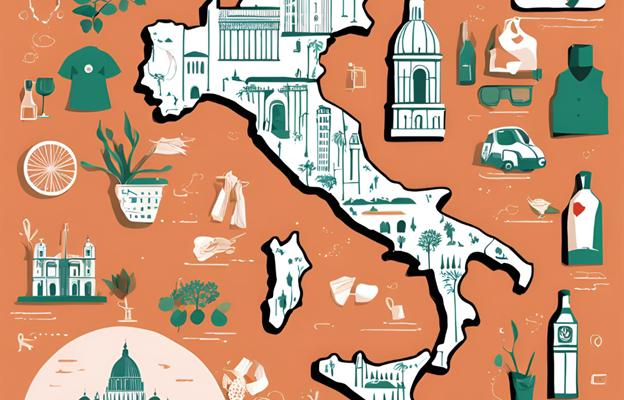

THE NEW FASHION - ITALY TOWARDS SUSTAINABLE FASHION
Italy has always been a central hub for fashion, renowned for its high-quality craftsmanship and luxury brands. In recent decades, increasing environmental awareness and international pressures have driven the Italian fashion sector to integrate more sustainable practices. Supporting technological innovation in the fashion industry has been recognized as crucial for maintaining Italy's global competitiveness, especially in a context where sustainability has become an essential criterion for consumers.
We will review some examples of how fashion is changing in Italy, highlighting small yet significant initiatives and efforts that are making the concept of sustainability increasingly fresh and powerful.
Cases and Examples of Sustainability in Italian Fashion
Gucci: Gucci was one of the first major fashion houses to obtain ISO 14001 certification for environmental management and introduced the "Gucci Equilibrium" initiative, which aims to reduce the environmental and social impact of its activities, including collections made with sustainable materials.
Stella Jean: The Italian-Haitian designer is known for her commitment to ethical fashion, collaborating with artisans from around the world to create collections that combine sustainability with respect for cultural traditions.
Econyl by Aquafil: Aquafil developed the Econyl yarn, made entirely from recycled materials such as recovered fishing nets and textile waste. This material is used by many sustainable fashion brands worldwide.
Oltre Moda: This brand has integrated sustainability into its business model, using organic and recycled materials and ensuring fair working conditions throughout the production chain.
Manteco: A Tuscan company leading in the production of sustainable fabrics, Manteco specializes in regenerated wool, with a production system that significantly reduces the use of natural resources and waste generation.
Funding Programs and Support for Innovation
National Innovation Fund (FNI): Managed by Cassa Depositi e Prestiti (CDP), this fund supports innovative startups, including those in the sustainable fashion sector, through venture capital investments. The goal is to finance projects that introduce new technologies or materials that reduce the environmental impact of textile and clothing production.
Research and Development Projects: The Ministry of Economic Development (MISE) offers funding for research and development projects in the textile and fashion sector, especially those focusing on sustainable innovation. These projects often involve collaborations between universities, research centers, and companies in the sector.
Transition 4.0: A program that supports the digitalization of businesses, including those in the fashion industry. Through tax credits, companies can invest in digital technologies that optimize resource use and improve energy efficiency in production.
Collaborations and Partnerships
National Technological Cluster "Made in Italy": An initiative that brings together universities, research centers, and businesses to promote innovation in the Italian manufacturing sector. Among the supported projects are those related to sustainability in fashion.
Milan Fashion Institute: A consortium of Milanese universities (Bocconi, Politecnico di Milano, Università Cattolica del Sacro Cuore) offering courses and research programs focused on sustainable fashion and innovation in the sector. They collaborate with companies to develop innovative and sustainable solutions.
Fondazione Pistoletto – Cittadellarte Fashion B.E.S.T.: A project promoting sustainable fashion through collaboration between artists, designers, and businesses. Cittadellarte is a center where ecological materials and innovative production processes are experimented with.

Image generated with AI
Examples of Startups and Innovative Projects
Orange Fiber: A Sicilian startup that has developed a sustainable fabric using citrus processing waste. The project has received international recognition and support from Italian innovation funds.
Vegea: A company that produces plant-based leather from winemaking residues. This example of a circular economy has been supported by innovation programs and has attracted the attention of global brands.
Isko™: Part of the Sanko group, Isko is one of the leading producers of sustainable denim, using innovative technologies to reduce water and energy consumption. It collaborates with Italian universities to continuously improve its production techniques.
How to Stay Informed
Official Websites:
- Ministry of Economic Development (MISE): Provides detailed information on grants, funding, and policies for sustainable innovation. Ministero delle Imprese e del Made in Italy (mimit.gov.it)
- Cassa Depositi e Prestiti (CDP): Section dedicated to the National Innovation Fund and sustainable projects. Cassa Depositi e Prestiti | CDP
- National Technological Cluster "Made in Italy": Information on ongoing projects and collaborations. WordPress – WordPress Description (cluster-madeinitaly.it)
Documentaries and Videos:
- "The True Cost": A documentary exploring the impact of the fashion industry on the environment and people. Available on various streaming platforms.
- TED Talks: Numerous TED Talks are available on sustainable fashion and innovations in the sector.
Events and Conferences:
- Pitti Immagine: One of the most important fashion events in Italy, with a growing focus on sustainability and innovation. PITTI IMMAGINE (pittimmagine.com)
- Green Fashion Week: An event dedicated to sustainable fashion that promotes change in the industry. Sustainable Fashion - Green Fashion Week

Az Európai Unió finanszírozásával. Az itt szereplő vélemények és állítások a szerző(k) álláspontját tükrözik, és nem feltétlenül egyeznek meg az Európai Unió vagy az Európai Oktatási és Kulturális Végrehajtó Ügynökség (EACEA) hivatalos álláspontjával. Sem az Európai Unió, sem az EACEA nem vonható felelősségre miattuk.
